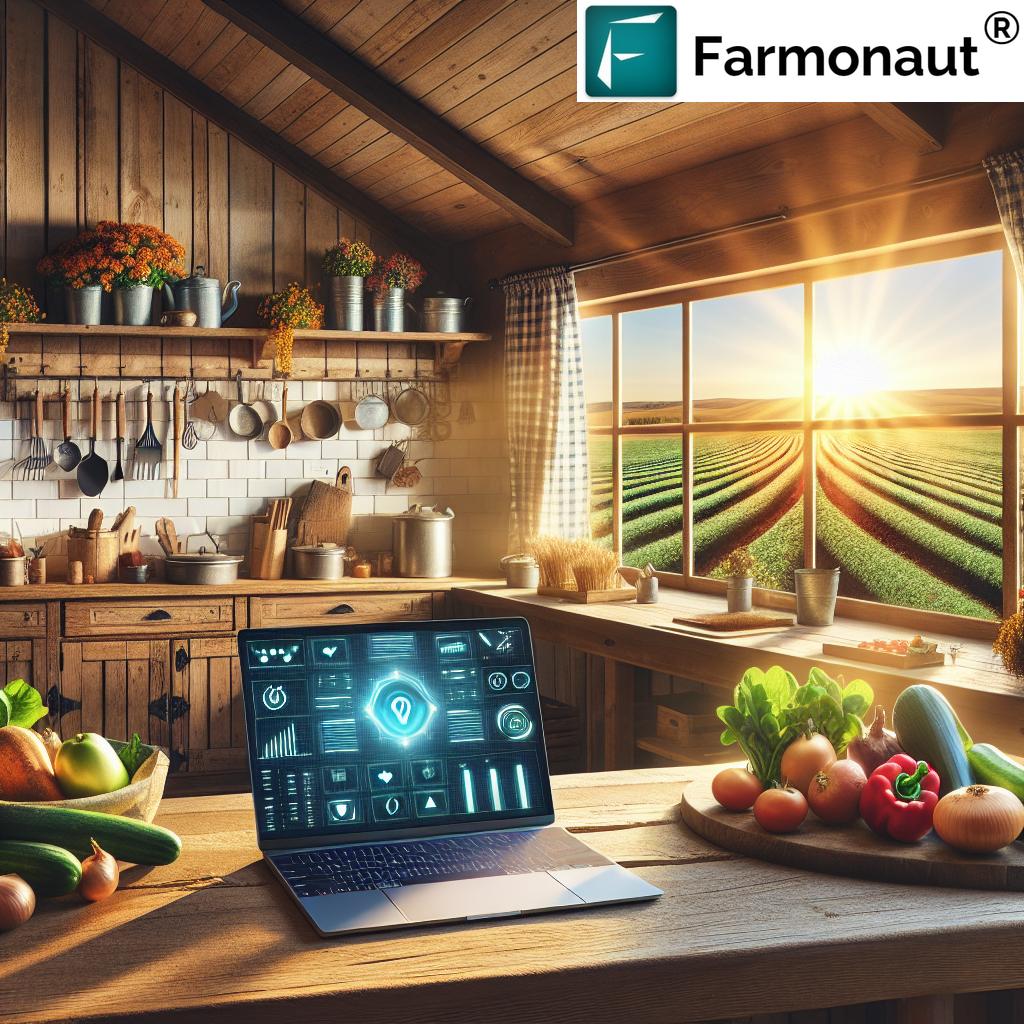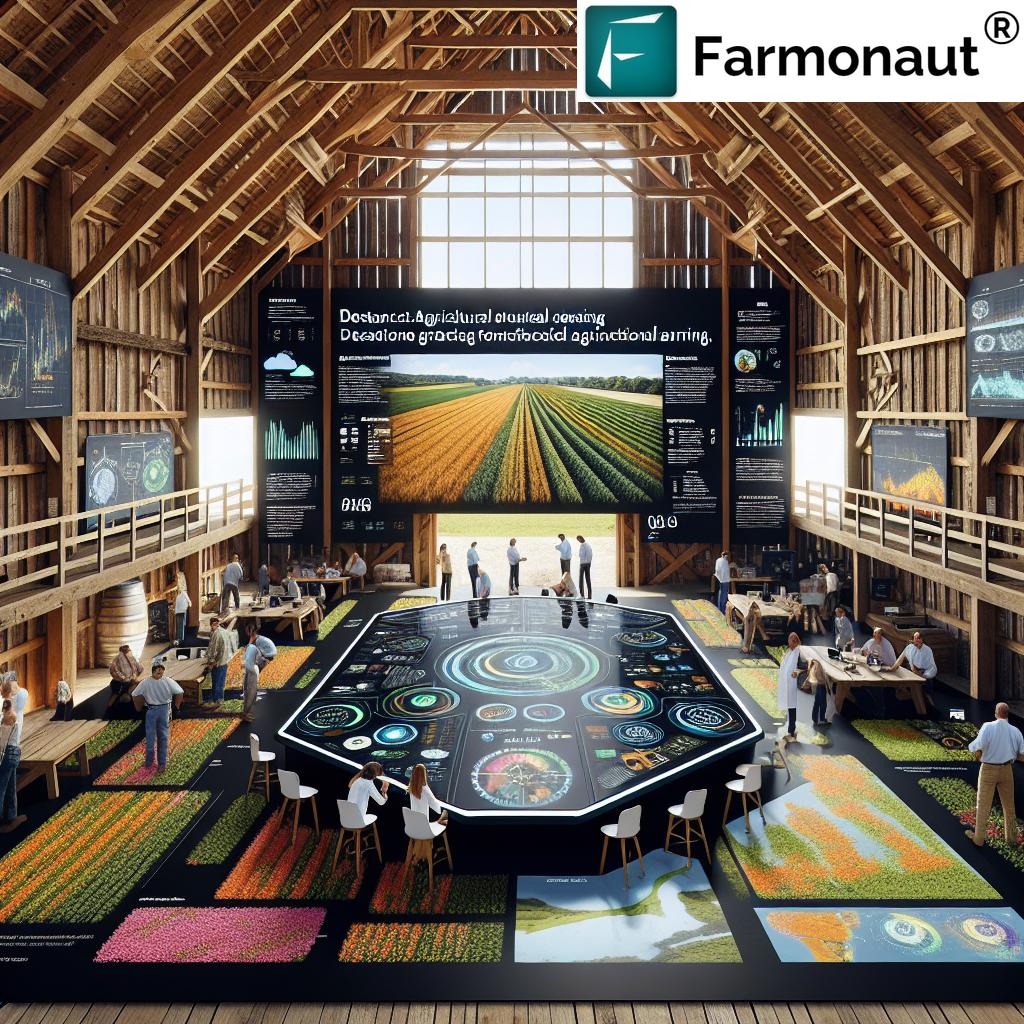Transforming Rural Spaces: How a South Dakota Farmhouse Became a Cozy Creative Retreat
“The average farmhouse renovation costs $100,000-$200,000, but can increase property value by up to 30%.”
Welcome to our journey of transformation, where we explore how a traditional South Dakota farmhouse evolved into a vibrant hub of creativity and innovation. In this blog post, we’ll take you through the inspiring story of the Circle F Farmhouse in Tripp, South Dakota, and how it represents a perfect blend of rural charm and modern agricultural technology. As we delve into this remarkable transformation, we’ll also highlight how companies like Farmonaut are revolutionizing the agricultural landscape with smart farming solutions and precision agriculture techniques.

The Birth of a Dream: From Working Farm to Creative Haven
Our story begins with Dennis and Jodi Fuerst, a couple with a vision to breathe new life into a traditional farmhouse. Located in the heart of Tripp, South Dakota, this property was more than just a house; it was a canvas for their dreams. The Fuersts saw beyond the weathered walls and aging infrastructure – they envisioned a space where creativity could flourish, and community could thrive.
As we embarked on this journey with the Fuersts, we couldn’t help but draw parallels to the transformative power of modern agricultural technology. Just as this farmhouse was about to undergo a remarkable metamorphosis, the world of farming is experiencing its own revolution through sustainable farming practices and agricultural innovation.
The Renovation Journey: Blending Tradition with Innovation
The process of transforming the Circle F Farmhouse was no small feat. It required careful planning, significant investment, and a deep respect for the property’s heritage. Here’s how the Fuersts approached this monumental task:
- Structural Upgrades: The first step was to address the farmhouse’s bones. This meant adding a garage and breezeway, creating a seamless flow between old and new spaces.
- Modernizing Systems: Just as precision agriculture techniques are revolutionizing farm operations, the Fuersts modernized the farmhouse’s HVAC systems, ensuring comfort in both winter and summer.
- Kitchen Remodel: The heart of any home, the kitchen underwent a significant transformation to accommodate group gatherings and cooking classes.
- Living Areas Expansion: To create inviting spaces for retreats and workshops, the living areas were expanded and redesigned.
Throughout this renovation process, the Fuersts faced challenges similar to those encountered by farmers adopting new technologies. It required patience, learning, and a willingness to embrace change while honoring tradition.
Integrating Smart Farming Solutions in Rural Spaces
While the Circle F Farmhouse was undergoing its physical transformation, we couldn’t help but think about the parallel digital transformation happening in farming. Companies like Farmonaut are at the forefront of this agricultural revolution, offering innovative solutions that are changing the face of rural landscapes.
Farmonaut, a pioneer in agricultural technology, provides advanced satellite-based farm management solutions. Their platform integrates seamlessly into both modern and traditional farm settings, offering tools for crop monitoring systems, AI-based advisory, and resource management.
Imagine a scenario where the fields surrounding the Circle F Farmhouse are managed using Farmonaut’s technology:
- Satellite imagery provides real-time data on crop health, allowing for precise interventions.
- AI-driven insights help in making informed decisions about irrigation and fertilizer use.
- Weather forecasts and expert crop management strategies are delivered directly to farmers’ smartphones.
This integration of technology doesn’t just improve farm productivity; it also aligns perfectly with the ethos of spaces like the Circle F Farmhouse – blending tradition with innovation to create something truly remarkable.
A Space for Creativity and Learning
The renovated Circle F Farmhouse is more than just a beautiful space; it’s a hub for creativity and learning. Here’s how this transformed rural retreat is making a difference:
- Workshops and Classes: The farmhouse hosts a variety of creative workshops, from sewing classes to craft sessions, fostering a sense of community and skill-sharing.
- Agricultural Education: Leveraging its rural setting, the farmhouse could potentially host workshops on modern farming techniques, showcasing how smart farming solutions are changing the agricultural landscape.
- Retreats and Reunions: The cozy atmosphere makes it an ideal location for family reunions and group retreats, offering a unique blend of rural charm and modern amenities.
This multifaceted approach to utilizing the space mirrors the versatility of modern farming technologies. Just as Farmonaut’s platform can be used for various aspects of farm management – from crop monitoring to resource optimization – the Circle F Farmhouse serves multiple purposes, adapting to the needs of its visitors.

The Impact of Digital Transformation in Rural Spaces
“Precision agriculture techniques can reduce water usage by up to 30% and increase crop yields by 10-15%.”
The transformation of the Circle F Farmhouse is a microcosm of the broader changes happening in rural areas due to technological advancements. Let’s explore how digital transformation in farming is reshaping rural properties and communities:
- Increased Efficiency: Just as the farmhouse’s new HVAC system improves comfort and energy efficiency, precision agriculture techniques optimize resource use on farms.
- Data-Driven Decision Making: Modern farmers use agricultural data analytics to make informed decisions, much like how the Fuersts used careful planning and feedback to guide their renovation choices.
- Community Building: Technology platforms like Farmonaut not only improve farming practices but also connect rural communities, fostering knowledge sharing and collaboration.
This digital revolution in agriculture is creating new opportunities for rural spaces to thrive, blending traditional values with cutting-edge technology.
The Role of Remote Sensing in Modern Agriculture
As we admire the beautifully renovated interiors of the Circle F Farmhouse, it’s worth noting how remote sensing in agriculture is transforming the landscapes that surround such rural properties. Farmonaut’s satellite-based solutions offer farmers unprecedented insights into their fields:
- Crop Health Monitoring: Satellite imagery provides detailed information on vegetation health, helping farmers identify issues before they become visible to the naked eye.
- Resource Optimization: By analyzing data on soil moisture and crop growth patterns, farmers can optimize irrigation and fertilizer use, reducing waste and improving yields.
- Predictive Analytics: Advanced algorithms use historical and real-time data to predict crop yields and potential threats, allowing for proactive management.
This technology not only improves farm productivity but also contributes to more sustainable farming practices, aligning with the growing global focus on environmental stewardship.
Fostering Innovation in Rural Communities
The Circle F Farmhouse, with its blend of rustic charm and modern amenities, serves as an inspiration for how rural spaces can evolve. Similarly, the integration of farm management software and advanced agricultural technologies is inspiring a new generation of farmers. Here’s how this parallel evolution is unfolding:
- Attracting Young Farmers: Just as the renovated farmhouse attracts visitors with its unique blend of old and new, modern farming technologies are making agriculture more appealing to younger generations.
- Encouraging Experimentation: The farmhouse’s creative workshops encourage artistic exploration. Similarly, precision agriculture tools allow farmers to experiment with new crops and techniques with reduced risk.
- Building Resilient Communities: By hosting gatherings and fostering connections, the farmhouse strengthens community bonds. Likewise, agricultural technology helps create more resilient and sustainable farming communities.
This synergy between traditional rural values and cutting-edge technology is key to the future of agriculture and rural development.
Explore Farmonaut’s API for Advanced Agricultural Insights
The Future of Rural Spaces and Sustainable Farming
As we look to the future, the transformation of the Circle F Farmhouse offers valuable insights into the potential of rural spaces. Similarly, the advancements in agricultural technology paint an exciting picture for the future of farming:
- Adaptive Reuse of Rural Properties: More old farm buildings could be repurposed into community spaces, blending heritage with modern needs.
- Integration of Smart Technologies: Future rural properties might seamlessly integrate smart home technologies with farm management systems, creating efficient and comfortable living spaces.
- Sustainable Practices: Both in renovations and farming, there’s a growing emphasis on sustainability, from energy-efficient buildings to precision agriculture that minimizes environmental impact.
Companies like Farmonaut are at the forefront of this agricultural revolution, providing tools that make sustainable and efficient farming accessible to all.
Access Farmonaut’s API Developer Docs for In-Depth Information
Embracing Change While Honoring Tradition
The story of the Circle F Farmhouse is a testament to the power of vision and hard work. It shows how rural spaces can be reimagined and repurposed while still honoring their agricultural roots. Similarly, the adoption of modern farm technology doesn’t mean abandoning traditional farming wisdom – it’s about enhancing it.
As we continue to witness the transformation of rural landscapes, both in terms of physical spaces and farming practices, it’s clear that the future of agriculture is bright. By embracing innovation while respecting tradition, we can create sustainable, vibrant rural communities that thrive in the modern world.
Comparing Traditional Farmhouses with Modern Creative Retreats
To better understand the transformation process, let’s take a look at how traditional farmhouses compare to modern creative retreats like the Circle F Farmhouse:
| Features | Before (Traditional Farmhouse) | After (Creative Retreat) |
|---|---|---|
| Interior Design | Functional, basic amenities | Blend of rustic charm and modern comforts |
| Technology Integration | Basic farm equipment | Smart home features, Wi-Fi, modern HVAC |
| Community Involvement | Limited to farming community | Hosts workshops, retreats, and gatherings |
| Agricultural Practices | Traditional methods | Potential for showcasing modern farming techniques |
| Estimated Workshop Attendees per Month | N/A | 50-100 (estimated) |
| Crop Yield Improvement | Baseline | 10-15% increase with precision agriculture (estimated) |
This comparison highlights not just the physical changes but also the shift in purpose and community impact that such transformations can bring about.
The Role of Technology in Modern Rural Living
While the Circle F Farmhouse focuses on creating a cozy, creative retreat, it’s worth noting how technology is reshaping rural living and farming practices. Farmonaut’s suite of tools exemplifies this technological revolution:
- Satellite-Based Crop Monitoring: Farmers can now track crop health and make data-driven decisions without stepping foot in the field.
- AI-Powered Advisories: Personalized recommendations help optimize farm management practices.
- Blockchain Traceability: Ensuring transparency and trust in the agricultural supply chain.
- Resource Management Tools: Helping farmers use water, fertilizers, and other resources more efficiently.
These technologies not only improve farm productivity but also contribute to more sustainable and environmentally friendly farming practices.
Creating a Hub for Agricultural Innovation
As we reflect on the transformation of the Circle F Farmhouse, we can’t help but imagine the potential for such spaces to become hubs for agricultural innovation. Here’s how renovated rural properties could contribute to the advancement of farming practices:
- Demonstration Sites: Showcasing the latest in precision agriculture techniques and smart farming solutions.
- Training Centers: Hosting workshops on using farm management software and interpreting agricultural data analytics.
- Community Gatherings: Bringing together farmers, technologists, and agricultural experts to share knowledge and ideas.
By bridging the gap between traditional farming and modern technology, spaces like the Circle F Farmhouse can play a crucial role in driving agricultural innovation forward.
The Impact on Rural Economics
The transformation of rural spaces like the Circle F Farmhouse and the adoption of modern agricultural technologies have significant implications for rural economies:
- Diversification of Income: Repurposed farmhouses can generate income through tourism and events, complementing traditional farming revenue.
- Job Creation: The intersection of agriculture and technology creates new job opportunities in rural areas, from tech support to data analysis.
- Increased Property Values: Well-renovated properties and technologically advanced farms can significantly increase land values in rural areas.
This economic boost helps sustain rural communities, making them more resilient and attractive to younger generations.
Sustainability: The Common Thread
One of the most striking parallels between the renovation of rural spaces and the adoption of modern farming technologies is the focus on sustainability. Both trends emphasize:
- Resource Efficiency: Whether it’s energy-efficient HVAC systems in renovated farmhouses or precision irrigation in smart farming.
- Waste Reduction: From upcycling materials in renovations to optimizing fertilizer use through data analytics in farming.
- Long-term Viability: Creating spaces and practices that can be sustained for generations to come.
This commitment to sustainability ensures that rural communities and agricultural practices can thrive well into the future.
The Human Element: Stories of Transformation
At the heart of both the Circle F Farmhouse renovation and the agricultural technology revolution are the people driving these changes. From the Fuersts’ vision for a community gathering space to the farmers adopting new technologies to improve their yields, these stories of transformation are deeply personal and profoundly impactful.
These individuals remind us that while technology and innovation are crucial, it’s the human spirit of creativity, resilience, and community that truly drives progress in rural areas.
Looking to the Future
As we conclude our exploration of the Circle F Farmhouse transformation and the parallel revolution in agriculture, we can’t help but feel excited about the future of rural spaces. The blend of tradition and innovation, comfort and technology, community and progress paints a promising picture for rural development.
Whether it’s a cozy farmhouse turned creative retreat or a field managed with cutting-edge precision agriculture techniques, these advancements are breathing new life into rural areas, ensuring they remain vibrant, productive, and connected in our rapidly changing world.
Frequently Asked Questions
- How does the transformation of rural spaces like the Circle F Farmhouse benefit local communities?
These transformations create new gathering spaces, attract visitors, and can boost local economies through tourism and events. - What role does technology play in modern farming practices?
Technology like satellite imaging, AI advisories, and precision agriculture tools help farmers make data-driven decisions, optimize resource use, and improve crop yields. - How can traditional farmhouses be adapted for modern use while preserving their character?
By carefully blending modern amenities with rustic elements, updating systems like HVAC, and repurposing spaces for new functions while maintaining the overall aesthetic. - What are some challenges in implementing smart farming solutions in rural areas?
Challenges can include internet connectivity issues, the initial cost of technology adoption, and the need for training to use new tools effectively. - How does precision agriculture contribute to sustainability?
Precision agriculture optimizes resource use, reduces waste, and can lead to more environmentally friendly farming practices by minimizing the use of water, fertilizers, and pesticides.
As we’ve seen through the transformation of the Circle F Farmhouse and the advancements in agricultural technology, rural spaces are undergoing a remarkable evolution. By embracing innovation while honoring tradition, these changes are creating vibrant, sustainable communities and more efficient farming practices. The future of rural living and agriculture is bright, filled with opportunities for creativity, community building, and technological advancement.






